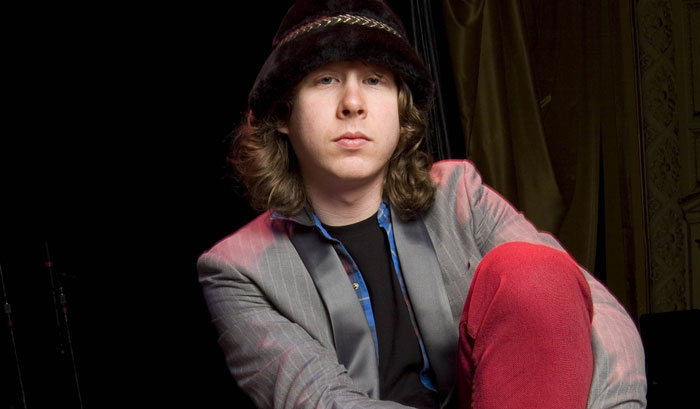


There's a story behind Ben Kweller's 2006 self-titled third album. "It's a good piano story, actually," he says. "When I was growing up in Greenville, Texas, my parents had this old upright from the 1800s. It was slightly out of tune, and it had broken keys, but I really got into writing songs on it. At some point my parents decided they should get a nicer piano and give me some lessons. So they gave the upright to a friend and got me a fancy baby grand. Then two years ago my mom called and said, 'Hey, I've got a surprise for you at the lake house.' What is it, I wondered? Maybe a boat? But when I arrived, they had my old upright piano on the porch! I wrote five of the key tracks on my new album that weekend. It really reaffirmed for me that instruments have a life of their own."
One of the songs was "Penny on the Train Track," which he's since performed on The Late Show with David Letterman, Last Call with Carson Daly, and other shows. The song was inspired by an encounter with an old high-school friend: "We both played the cymbals in the band--it was the easiest instrument!" laughs Ben. "Anyway, he's a police officer now. And I realized how we were growing up and having more responsibility, and how everything happens the way it's supposed to."
Every guitar and piano has songs in it.
For Kweller, it's hard to imagine a non-musical path. He learned piano, guitar, and drums at an early age, and won an honorable mention in a Billboard magazine songwriting contest at age nine. Now 26, he made his major-label debut at 15 when his grunge band, Radish, was signed to Mercury Records.
Despite a huge promotional push, Radish released just one album before being dropped. But Kweller wasn't through with the music business. Since he resumed recording seven years ago, his fan base has continually grown thanks to an engaging web presence, a steady stream of EPs and albums, and appearances alongside such artists as Ben Folds and Death Cab for Cutie.
It's been a decade since his Radish days, but Kweller sees continuity between his first and second careers. "Musically, it's very different," he says. "But I still have a lot of that youthful punk rock energy. I might be playing a country song, but I still have the loud guitar aesthetic within me. It's hard for me to relate to the old Radish lyrics, though, because they were about non-experience, things I didn't know about. Some of them make me laugh, remembering what this 14-year-old boy was going through! But that's what I like about music and art in general. It's a documentation of time and space."
Finding the right instruments--the ones with stories inside--is a recurring theme for Kweller. He recalls a conversation he once had while touring with Evan Dando of the Lemonheads: "I'd just signed my deal as a solo artist, and I saw this acoustic guitar at a store in San Francisco for $1,700, which was more than I was paying for rent in New York! But Evan said, 'Dude, you deserve to buy yourself a cool guitar. Besides, every guitar and piano has songs in it. You owe it to yourself as an artist to get an instrument if you have a feeling for it.'"
So Ben was pleased to discover the Yamaha CP280 Clavinova, which he uses onstage. "For live shows, it's always been my mission to find a digital piano that looks like a piano and has an organic feel," he explains. "It's really difficult to mike an acoustic piano live, especially when you're competing with drums, bass, and guitars. Also, I like my monitors pretty loud, but it's hard to get a piano loud in the wedges without feeding back. With the Yamaha CLP280, I feel like I've found what I was looking for. It sounds so beautiful! I've been very happy with it."
Kweller is grateful that he's had the opportunity to share his stories with his fans. "I feel lucky and blessed that I've affected people in a positive way," he says. "People come up to me at shows and say, 'Me and my girlfriend of eight years just broke up, and your song got me through it.' Or, 'My best friend just died in a car accident, and your record was her favorite thing, so it's all I listen to now.' Things like that are why I do it. And I know it's going to be a lifelong mission."
























